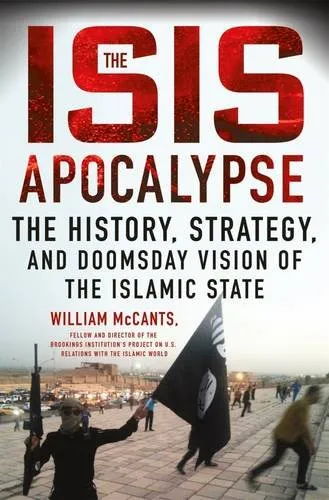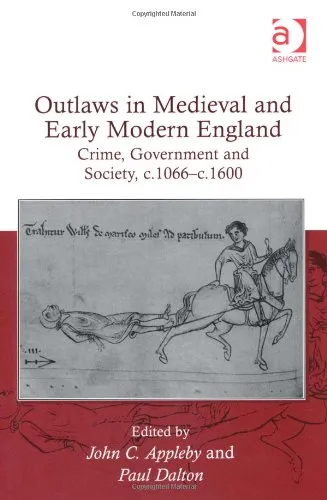The ISIS Apocalypse: The History, Strategy, and Doomsday Vision of the Islamic State
4.5
Reviews from our users

You Can Ask your questions from this book's AI after Login
Each download or ask from book AI costs 2 points. To earn more free points, please visit the Points Guide Page and complete some valuable actions.Related Refrences:
Introduction to 'The ISIS Apocalypse: The History, Strategy, and Doomsday Vision of the Islamic State'
Written by William McCants, 'The ISIS Apocalypse' is a gripping exploration of one of the most dangerous and ideologically-driven terrorist organizations of modern times—the Islamic State, also known as ISIS. With historical depth, strategic analysis, and a deep dive into its apocalyptic vision, the book sheds light on how ISIS emerged, operated, and captured the world's attention. This book is not only a historical account but also a roadmap for understanding the group's motives, myths, and aspirations.
By combining historical research with insights from Islamic theology and political strategy, McCants uncovers the unique characteristics that set ISIS apart from other extremist groups. From its medieval fantasies rooted in apocalyptic dogma to its modern guerrilla warfare strategies, the book illuminates how ISIS managed to create, sustain, and expand its version of a so-called Islamic State. Through clear, concise prose, McCants offers a rare blend of storytelling and scholarly expertise, making this book essential reading for policymakers, historians, and anyone seeking to understand the mechanics of global extremism.
Detailed Summary of the Book
The ISIS Apocalypse traces the evolution of ISIS from its origins as an offshoot of al-Qaeda to becoming a self-declared caliphate. McCants explains how the founding charter of ISIS was anchored to the teachings of its spiritual leader, Abu Mus‘ab al-Zarqawi, and how the group exploited regional instability in Iraq and Syria to grow its base of power. The author delves into how sophisticated propaganda campaigns, savvy use of social media, and a combination of brutal yet calculated warfare enabled ISIS to galvanize recruits from across the world.
A significant portion of the book is dedicated to explaining its apocalyptic ideology. McCants explores how ISIS carefully crafted its narrative around the Islamic prophecies of the end times, portraying itself as the harbinger of redemption and divine justice. The group’s fixation on creating a caliphate wasn’t just based on aspirations for governance—it was a symbolic fulfillment of prophecy, making its vision deeply resonant with followers who subscribed to its religious worldview.
The book also examines internal governance within ISIS, including its efforts to establish a functioning state apparatus with a judiciary, taxation system, and propaganda arm. Equally, McCants explores fractures within the group, rivalries within global jihadist networks, and the impact of external interventions, showing how these factors contributed to both the group's strengths and its eventual decline.
Key Takeaways
- ISIS emerged against the backdrop of regional instability, particularly in Iraq and Syria.
- The group’s narrative is deeply rooted in apocalyptic Islamic beliefs, forming the basis for its doctrine and strategy.
- Social media and modern communication tools played a pivotal role in ISIS's recruitment and propaganda campaigns.
- The group's strategy focused not just on military conquests but on governing territory as a prelude to its apocalyptic vision.
- The eventual weakening of ISIS highlights the vulnerabilities in its rigid ideology and decentralized operational model.
Famous Quotes from the Book
"To understand the Islamic State’s success is to understand its power to harness a vision of the end times to a century-old ideology of political Islam."
"What drew followers to the Islamic State was not just fear of its violence but the hope it promised."
"The Islamic State is not the result of irrationality or blind religious fervor. It is disturbingly rational, an organization with a strategic blueprint."
Why This Book Matters
The ISIS Apocalypse is more than just an account of the Islamic State’s rise and subsequent fall; it is an analysis of how ideology and pragmatism intersect to create modern extremist organizations. The book offers valuable lessons about the conditions that give rise to such groups, their ability to exploit global chaos, and the ways in which they manipulate history and religion to justify their actions.
In the wake of ISIS's territorial defeat, the book remains relevant as an essential primer on how extremist groups evolve over time. It serves as a guide for policymakers, military strategists, and civic leaders who seek to counter ideological extremism by addressing both its political roots and symbolic power.
McCants’ work stands out because it communicates complex ideas in a way that is both accessible and authoritative, making it an indispensable resource for understanding not only ISIS but also the broader phenomenon of global jihadism. In an era where extremist threats continue to challenge global security, The ISIS Apocalypse offers a blueprint for understanding and countering such movements effectively.
Free Direct Download
You Can Download this book after Login
Accessing books through legal platforms and public libraries not only supports the rights of authors and publishers but also contributes to the sustainability of reading culture. Before downloading, please take a moment to consider these options.
Find this book on other platforms:
WorldCat helps you find books in libraries worldwide.
See ratings, reviews, and discussions on Goodreads.
Find and buy rare or used books on AbeBooks.
1395
بازدید4.5
امتیاز0
نظر98%
رضایتReviews:
4.5
Based on 0 users review
Questions & Answers
Ask questions about this book or help others by answering
No questions yet. Be the first to ask!

![Mathematics and Its History [FIXED]](https://s3.refhub.ir/images/thumb/Mathematics_and_Its_History__FIXED_29231.webp)













